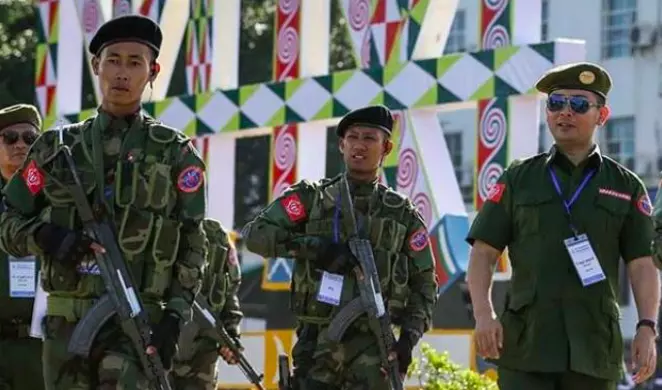
- Home
- India
- World
- Premium
- THE FEDERAL SPECIAL
- Analysis
- States
- Perspective
- Videos
- Sports
- Education
- Entertainment
- Elections
- Features
- Health
- Business
- Series
- In memoriam: Sheikh Mujibur Rahman
- Bishnoi's Men
- NEET TANGLE
- Economy Series
- Earth Day
- Kashmir’s Frozen Turbulence
- India@75
- The legend of Ramjanmabhoomi
- Liberalisation@30
- How to tame a dragon
- Celebrating biodiversity
- Farm Matters
- 50 days of solitude
- Bringing Migrants Home
- Budget 2020
- Jharkhand Votes
- The Federal Investigates
- The Federal Impact
- Vanishing Sand
- Gandhi @ 150
- Andhra Today
- Field report
- Operation Gulmarg
- Pandemic @1 Mn in India
- The Federal Year-End
- The Zero Year
- Science
- Brand studio
- Newsletter
- Elections 2024
- Events
- Home
- IndiaIndia
- World
- Analysis
- StatesStates
- PerspectivePerspective
- VideosVideos
- Sports
- Education
- Entertainment
- ElectionsElections
- Features
- Health
- BusinessBusiness
- Premium
- Loading...
Premium - Events

As Arakan Army moves towards realising its dream of a free Rakhine state, India will needs all its diplomacy to handle the unfolding crisis at its eastern gates
In a January 2022 interview with Asia Times, Arakan Army chief Maj Gen Twan Mrat Naing said that his group has grown to 30,000 soldiers. In the last two years, that number seems to have grown further because when the military junta declared an informal ceasefire with the Arakan Army just three months before the February 2021 coup, the Arakan Army (AA) focussed on building its strength rather than frittering it away by joining the pro-democracy resistance.
Arakan Dream
Soon after the coup, the military attempted to stabilise the Rakhine State by providing favours, such as ending the 18-month-long Internet shutdown and offering the Arakan National Party leader a seat on its administrative council on February 2, 2021. The regime also released Rakhine nationalist politician Dr Aye Maung and Rakhine writer Wai Han Aung on February 13, 2021, in addition to the AA leader’s family members on June 9, 2021, to gain the favour of the group and the Rakhine people.
In March 2021, the Arakan Army and its political wing, the United League of Arakan (ULA), were delisted from the “terrorist list”, though the junta has kept the group on the list of “unlawful associations”.
The junta did not realise that the AA/ ULA leadership was focussed on a clear political objective – independence as envisioned in its well-articulated "Arakan Dream".
Then it forged the Brotherhood Alliance with two other North Myanmar-based rebel groups and unleashed a powerful military offensive in November last year. The Burmese army was clearly taken by surprise as more and more rebel groups joined the offensive.
Arakan Army advances
The latest battlefield reports indicate that the Arakan Army (AA) has seized 10 of the 17 townships in western Myanmar’s Rakhine State. Contrast this to the Bangladeshi Mukti Fauj who even with complete Indian help, had not been able to seize an important town in East Pakistan in 1971 before the Indian military intervention.
The Arakan Army now controls Buthidaung, Rathedaung, Pauktaw, Ponnagyun, Kyauktaw, Mrauk-U, Minbya and Myebon townships in northern Rakhine, Ramree and Thandwe townships in southern Rakhine, and the Paletwa Township in neighbouring Chin State.
It has also seized much of Maungdaw Township in northern Rakhine, which borders Bangladesh.
Between November and mid-January, the Arakan Army seized Paletwa Township after capturing a junta headquarters of two military divisions. Then it expanded the offensive on multiple fronts in Rathedaung, Minbya, Kyauktaw, Mrauk-U and Ponnagyun, seizing the 9th Military Operations Command and 10 battalion headquarters under its control, an artillery battalion, a police battalion, an advanced military training school, and two battalion headquarters under the 15th Military Operations Command and Western Command respectively.
The offensive is now in its third phase, with the AA fighting in Buthidaung and Maungdaw near the Bangladeshi border in Ann, where the Western Command is based; and in Taungup, Thandwe and Gwa townships in southern Rakhine state. Buthidaung and Thandwe have fallen and are being cleared of pockets of junta resistance.
By all indications, the next target of the Arakan Army is Sittwe ( former Akyab), the administrative headquarters of the Rakhine state. The AA formations are closing down the approaches to Sittwe and have taken control of a key naval base on the Rakhine coast. The AA may avoid a direct attack on the deep sea port of Kyaukphyu, funded and developed by the Chinese. They know once Sittwe falls, the military junta will not be able to hold on to Kyaukphyu or any other area in Rakhine.
Is India prepared?
India's multi-million dollar Kaladan Multimodal Transport project, which aims to provide a second access point to the country's northeast, is centred around Sittwe. It envisions a sea connection from Kolkata to Sittwe, a Kaladan river connection from Sittwe to Paletwa (already under AA control), and finally, a road connection from Paletwa to Zorinpuii in Mizoram.
Even if the Arakan Army does not go for a formal proclamation of independence in Rakhine in deference to its allies, many of who want a truly federal Myanmar but no secession, the fact of having to deal with the Arakan Army is inevitable for both India and China.
India's relationship with the Arakan Army has been less than friendly – Delhi unleashed “Operation Sunshine” against its bases in the vicinity of southern Mizoram to please the military junta and the rebels responded by attacking contractors working on the Kalafan Multimodal Transport project at Paletwa.
Though the Arakan Army has recently promised not to disturb "projects beneficial to the Rakhine people" in a subtle message to Delhi seeking legitimacy, it is anybody's guess how the rebels would react if India refuses to officially deal with the rebel authority.
If Sittwe falls to the Arakan Army, New Delhi will face an immediate diplomatic challenge – to keep its consulate in Sittwe open and deal with the AA/ ULA or close it down like in Afghanistan. Then if the rebels proclaim independence comes the question of recognition.
The fall of Sittwe may take a while but going by the battlefield realities in the last 10 months, many consider it a fait accompli.
India cannot afford to upset the AA/ULA if it wants the Kaladan project but it cannot also upset the Burmese military junta, at least, until it remains in power. Delhi is clearly caught between the rock and the hard place and needs its diplomatic best to handle the unfolding crisis on its eastern gates.


